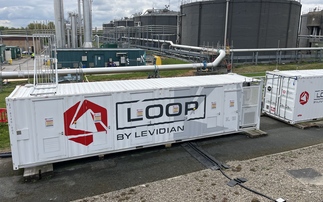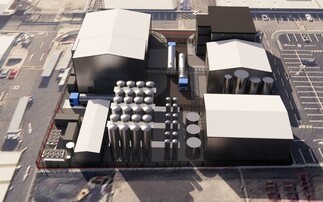James Murray's speech to the BusinessGreen Technology Awards 2017
Ladies and gentlemen, welcome to the third annual BusinessGreen Technology Awards.
This afternoon's event is a celebration of the best of British clean technology.
A platform for the UK's most inspiring green businesses.
A gathering of entrepreneurs, engineers, and innovators who believe so passionately in the power of technology you could almost convince them you can police the post-Brexit Irish border with blockchain and blimps - almost, but not quite.
I want to start by extending a heartfelt thank you.
Thank you for entering these awards and joining us here at the Institution of Engineering and Technology.
But more importantly thank you once again for the work you do.
Journalists are prone to hyperbole, but it is not hyperbole to say you and your peers are engaged in some of the most important work in human history.
Let me explain why - and just to forewarn you these awards may be an upbeat, end-of-year celebration of your achievements, but things are about to get pretty bleak for a few minutes.
As Dr Emily Shuckburgh of the British Antarctic Survey explained at the recent BusinessGreen Leaders' Summit atmospheric concentrations of greenhouse gases are at their highest level in between three and five million years
The last time the atmosphere experienced such high levels of greenhouse gases sea levels were 10 metres higher than they are currently.
There are entirely credible reasons to think sea levels could rise by between one and two metres this century - that is to say well within the lifetime of today's children.
This grand old building is looking a bit too close to that beautiful old river for comfort.
We can avert the worst of these risks if we slash greenhouse gas emissions in a rapid and sustained way, but the most recent data suggests that after a few years when global emissions have stalled they are now rising again.
This rise may prove to be a blip, but we are moving in the wrong direction.
And if you look for political leadership to avert this crisis, the picture is, how can we put this… mixed.
Last year's awards occurred in the wake of Donald Trump's election victory.
At that point we were still asking ourselves quite how reckless, repulsive and racist he might prove to be as President.
I think we can now safely say the answer is very. Very reckless. Very repulsive. Very racist.
On the environment he has more than lived down to expectations.
Only this week he gave the green light to Arctic drilling. As with his approach to race relations, economic management, and national security, Trump's approach to the environment has been to find a bonfire and pour kerosene on it.
Elsewhere every other government remains committed to the goals of the Paris Agreement and the British government has made some admirable progress with its Clean Growth Strategy.
But we are not yet on track to meet the Paris goals. And if a year ago we were asking if the UK government had the competence and capacity to deliver a successful green Brexit, 12 months on we are asking if the UK government has the competence and capacity to deliver a successful green Brexit.
We are in the midst of what could prove to be an existential climate crisis and it remains an open question as to whether catastrophe can be averted.
And that's where you come in.
Because here is the good news.
In the decade since BusinessGreen launched, renewables share of the UK power mix has gone from less than five per cent to 24 per cent.
Low carbon power's share of the power mix has topped 50 per cent.
This summer there were days when the UK operated without any coal power for the first time since the 19th century.
Greenhouse gas emissions have fallen more than 20 per cent, even as the economy has grown.
The cost of solar power has fallen 80 per cent and wind power costs have halved.
10 years ago electric vehicles were milk floats and smart grids were an engineering pipe dream. Now electric vehicles look like the most desirable, high performance cars on the market and smart grids are fast becoming a reality.
The green economy as a whole has gone from a niche concern to a sector worth over £43bn a year employing nearly 450,000 people.
But the fact is the scale of the environmental challenges we face are now so big we urgently need to accelerate progress still further.
As Google's Larry Page has observed "in technology, we need revolutionary change, not incremental change".
We need to harness the power of innovation and the innovation of power.
And not just power, we need to see disruptive innovation in transport, industry, agricultural, construction and every other sector.
In essence we need to change the way the economy and its underlying infrastructure operates on almost every level.
It is a daunting challenge. But there are two important pieces of good news here too.
The first is the importance of innovation is finally being properly recognized by both political and business leaders.
The most heartening aspect of the government's Clean Growth and Industrial Strategies was the unequivocal recognition of the importance of innovation and the significant funding to support it.
Since unveiling the Clean Growth Strategy, Climate Minister Claire Perry has repeatedly stressed that the only way to meet the UK's emissions targets is through innovative new technologies, some of which we may not even have thought of yet.
Meanwhile, you would be hard pushed to find a serious corporate player that has not recognized how clean tech will shape and disrupt their business in the coming decades.
Just this week Shell announced it was joining a major initiative to deploy electric vehicle charging stations across Europe, building on the launch of its first EV charging points in the UK.
Could one of the world's largest oil giant's become a provider of electric vehicle infrastructure?
Could we one day look back on Shell's focus on digging up fossil fuels in the same way we now look at how IBM once made coffee grinders and meat slicers or how Peugeot started out making salt and pepper mills?
I wouldn't bet against it.
The second bit of good news is that, as all of you here today prove, many of the innovations we need are either already with us or in the pipeline.
The US inventor Dean Kamen once said that "every once in a while, a new technology, an old problem, and a big idea turn into an innovation".
Kamen was most famous for inventing the Segway, so it is fair to ask whether his most famous gift to the world qualifies as an innovation under his definition, but the point stands (actually that's a little unfair, Kamen invented numerous useful products).
Regardless, across the clean tech space we have plenty of old problems and we are now seeing new technologies and big ideas come together at a breakneck pace.
In energy and buildings and biotech and material science and agriculture and transport and heavy industry and chemicals and every other corner of the economy we are seeing important and exciting breakthroughs made on a daily basis.
It is our privilege at BusinessGreen to write about these advances and we are delighted that many of them are represented in this room.
Whether or not you emerge victorious this afternoon you should be hugely proud of the work you do and should never doubt its immense importance.
As mentioned, these awards are intended as a celebration of your work and I hope you have a great afternoon. But there is another, more serious, purpose to them.
Lord Stern described climate change as the greatest market failure the world has ever seen, but he actually argued it is driven by not one but six market failures.
Everyone focuses on the failure to put a price on pollution, but there are other failures and two of them relate directly to BusinessGreen's mission.
There is a failure of networks as people and technologies struggle to integrate to maximize the benefits they can offer and there is a failure of information as market actors remain unaware of the solutions that are available.
These awards, not to mention our daily coverage of the green economy, are in their own small way attempting to tackle these market failures by ensuring you are your peers and prospective customers are as connected and informed as possible.
So I have a favour to ask. Please use these awards as they were intended. Please talk to your peers and prospective partners and please make use of the fact you are finalists here in your marketing and outreach.
Please also keep an eye out for our next BusinessGreen Technology and Investment Forum early next year, where we will be working with Innovate UK once again to bring together exciting early stage clean tech firms and prospective investors.
The past two pitch sessions have been a huge success with several of the start-ups entering into extremely fruitful dialogue with investors as a result.
Most of all though, please tell people about your well-deserved success, promote what you do far and wide.
Because, as I said at the start, you are engaged in some of the most important work in human history.
And for that I have to say one last thank you.
Thank you to the BusinessGreen team for organizing today's celebration.
Thank you to our sponsors and partners, Withers and Rogers and Clean and Cool for helping to make today possible.
Thank you to the wonderful Robert Llewellyn for hosting today's ceremony.
And most of all thank you to all our finalists for your continued support of BusinessGreen and the work that you do.
The most famous quote about technology is still Arthur C Clarke's observation that "any sufficiently advanced technology is indistinguishable from magic".
Sadly, we can't rely on magic to build a cleaner and more prosperous economy, so we will have to make do with sufficiently advanced technology. Thankfully, you are delivering it.
Thank you.










